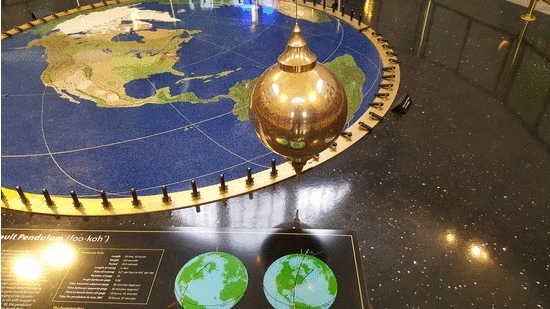Foucault’s Pendulum
By The Landlord
“You can't blame gravity for falling in love.” – Albert Einstein
“Love is metaphysical gravity … I say that radiation is inherently disintegrative: it comes apart. Gravity is inherently integrative: it pulls together. And to me, there's a good possibility that love is what I'd call metaphysical gravity. It really holds everything together.” – Richard Buckminster Fuller
“Gravity is only the bark of wisdom's tree, but it preserves it.” – Confucius
“Awake, arise or be for ever fall’n.” – John Milton, Paradise Lost
“Gravity is matter’s sugar daddy.” – Brian Greene
“String theory is based on the simple idea that all the four forces of the universe: gravity, the electromagnetic force and the two nuclear forces, can be viewed, as music.” – Michio Kaku
“Strings of gravity vibrate at a different frequency than strings of light.” – Roy H. Williams
“Gravity is a habit that is hard to shake off.” – Terry Pratchett
“It's only when gravity starts to take over you begin to think about your body.” – David Soul
“I defy gravity.” – Marilyn Monroe
“The true art of being young is knowing how to defy gravity and upset as many people as possible while doing it. How to penetrate the great secrets of the universe and damn the torpedoes. How to stir the demons of our destiny.” – Mick Rock
“Space music would be really something ... but they don't have no gravity up there. You couldn't have no downbeat!” – Miles Davis
Mass attraction? Falling in love? There are invisible, at times, seemingly inexplicable, immeasurable forces constantly affecting our bodies, minds, our movements, our buildings, our environment, our lives. But without one of them in particular, we would not be able to walk, or hold onto anything, but would likely float off into an infinite void, or as Isaac Newton put it, “go off in a straight line into the heavens”.
And as American astrophysicist Neil deGrasse Tyson puts it: “We account for one-sixth of the forces of gravity we see in the universe. There is no known objects accounting for most of the effective gravity in the universe. Something is making stuff move that is not anything we have ever touched.”
Gravity is defined as the mutual attraction between all masses in the universe, felt, because of their sheer size, most prominently at the surfaces of planets or other celestial bodies, and most vitally also for us, Earth. But while we exist with, and completely depend on it, in physics, gravity is actually the weakest of the four “fundamental interactions”, considerably less powerful than electromagnetism, which governs forces binding and governing the behaviour of particles, which make up us and everything, as well as two mind-boggling nuclear ones – known as “strong interaction” and “weak interaction”. Somehow Earth’s gravity, which makes objects drop to the floor at roughly 9.8 metres per second, which is pretty noticeable fast, is still 10 to the power of 29, or 1,000,000,000,000,000,000,000,000,000,000 times weaker than “weak interaction”.
So this could be regarded as weighty scientific topic, but also a metaphorical one and could inspire songs about falling, or various forms of attraction, or even other associations, such as matters of gravity in the sense of high-mindedness or seriousness, but as long as gravity or its meaning is central or prominent within your song suggestion.
As I cycle or walk through my city home, even in similar weather conditions, sometimes it feels like real drag, requiring extra effort, but at others it can seem an almost effortless, entropic, floaty locomotion. Is that just my imagination, or fluctuating mood or physical health? Or could the gravity of the moon, which after all governs our tides twice a day, also have an effect, seeing as 70% of the human body is made of water?
Gravity has long been a subject of study since at least Ancient Greek times, where Aristotle believed that objects fell towards the Earth because it was the centre of the universe. Clearly things moved on a little from there, from Spanish Dominican priest Domingo de Soto writing in 1551 that bodies in free fall uniformly accelerate, to Galileo Galilei's measurements of balls rolling down inclines studying gravitational acceleration. And of course Isaac Newton (who did not actually conceive the idea from a falling apple under tree) with his gravitational theory with an equation to measure that universal forces "which keep the planets in their orbs must [be] reciprocally as the squares of their distances from the centres about which they revolve”.
Portrait of Sir Isaac Newton(1689)
Einstein’s theory of relativity, perhaps the most fundamental breakthrough, later corrected Newton after astronomers noticed eccentric fluctuations in the orbit of the planet Mercury, leading to a new definition - that the effects of gravitation are ascribed to spacetime curvature instead of a force.
Your songs might take all manner of gravity-related science, from black holes to string theory, and of course the work of Stephen Hawking, who corrected his forbears by telling us that “gravity shapes the large scale structure of the universe, even though it is the weakest of four categories of forces”, but also “bodies like the Earth are not made to move on curved orbits by a force called gravity; instead, they follow the nearest thing to a straight path in a curved space, which is called a geodesic. A geodesic is the shortest (or longest) path between two nearby points.”
Hawking’s study of black holes might be another form of metaphor or literal inspiration for songs. Theoretical astrophysicist at Yale University, Priyamvada Natarajan, describes them as “enigmatic astronomical objects, areas where the gravity is so immense that it has warped spacetime so that not even light can escape.”
This video examines the idea of what it might be like to fall into a black hole, as well some music by Icelandic composer Anna Þorvaldsdóttir:
So this week it’s as how we might perceive gravity as theorise about it, and above all how it is expressed as an artform.
Here’s the experimental artist MC Escher on the subject, whose obsession is itself about messing playing with this very subject: “I can't keep from fooling around with our irrefutable certainties. It is, for example, a pleasure knowingly to mix up two and three dimensionalities, flat and spatial, and to make fun of gravity.”
‘Making fun of gravity’: MC Escher’s Relativity
Gravity can be perceived in different ways - as something that weighs us down, or something that helps and inspires us. In the former, more nebulous category, among today’s Bar visitors is the writer Alan Cohen who says: “You will find truth more quickly through delight than gravity. Let out a little more string on your kite.” And meanwhile yogic writer Mandy Ingber reckons: “We’re always in the middle of two energies. Gravity is sinking you down; inspiration is pulling you up.”
Artist Marcel Duchamp also gives us another way of perceiving it: “Gravity is not controlled physically in us by one of the 5 ordinary senses. We always reduce a gravity experience to an autocognizance, real or imagined, registered inside us in the region of the stomach.
That’s all very well, but gravity is very useful indeed, and here’s Caitlin Moran pointing out a more down-to-earth form of reality: “If you are lying down to give birth, gravity is not helping you. You know, you stand up and, you know, a baby will basically kind of fall out of you.”
But perhaps one most visually rewarding scientific demonstration of the nuances of gravity came from French physicist’s Léon Foucault's pendulum of 1851, conceived as an experiment to demonstrate the Earth's rotation, not only around its own axis, but also around our sun. Here is his original model in the Pantheon in Paris:
Philosopher Arthur Schopenhauer is also here, adding this witty swingometer: “Opinion is like a pendulum and obeys the same law.”
Yet the science as also inspired various musical instruments, such as the gravity harps conceived by Björk and Andy Cavatorta, variously displayed and played on tour, such as at MoMA in New York, and also in Manchester:
Björk further added that: “Since I was a kid, I always wanted to figure out how to make a bass line that was a pendulum - like, gravity would control it, and then you could make it play different notes.”
From sublime to ridiculous, Björk former husband, the American artist and film director Matthew Barney, made an amusing comment on a very different artform: “Jackass: The Movie is great. I think it's in the tradition of physical comedy, which I'm really interested in. Its relationship to gravity, and how gravity acts on the body.”
But the foolhardy japes of the Jackass team is nothing compared to the daredevil, and often fatal stunts of extreme base jumpers or wing suit flyers, who both use, and try to defy gravity at the same time:
That’s certainly a long way from Thomas Carlyle’s remark that: “It is a mathematical fact that the casting of this pebble from my hand alters the centre of gravity of the universe.”
But another way to look at gravity is to experience its absence, or compare it to other planets. Astronauts who landed on the moon experienced a floaty, lower gravity than that of Earth, while planet Jupiter’s size and gravitation pull is many times bigger, but if we were to theoretically set foot on that planet, its surface gravity is just 2.4 times bigger, because Jupiter is mostly made up of gases. Still if we’d feel two and half times heavier there. And with that gaseous place, let’s add this observation by John Burroughs: “The floating vapour is just as true an illustration of the law of gravity as the falling avalanche.”
Gravity is of course relative. What constitutes “the hallmark of planetoid”? American engineer and planetary scientist Alan Stern, who coined that phrase, reckons that Pluto is still “massive enough to have its shape controlled by gravity rather than material strength,” even though its surface gravity is only a twelfth of Earth’s.
But while Americans were proud to be claim first human landings on the moon, it was the Russians who really pioneered space travel in many other ways, and Polish Soviet rocket scientist Konstantin Tsiolkovsky (1857–1935) was an early pioneering figure in that breakthrough, pronouncing that: “Man must at all costs overcome the Earth's gravity and have, in reserve, the space at least of the Solar System.”
But can can escape much of Earth’s gravity without leaving the planet? “From birth, man carries the weight of gravity on his shoulders. He is bolted to earth. But man has only to sink beneath the surface and he is free,” remarks scuba diving marine explorer and pioneering documentary maker Jacques Yves Cousteau.
Jacques Cousteau: floated his own gravity-defying experiences…
But when it comes to leaving our planet, astronauts struggle against, or variously use gravity. Buzz Aldrin for example, here describes the term aero braking: “That's a way to use the gravity and upper atmosphere of Earth to sling shot a ship out either deeper into space, or slow it down to be 'captured' by Earth's gravity.”
But what is it like to be free of that pull? “Zero gravity is such an alien environment –- completely different from everything we've grown up with every single day of our lives. And it's incomprehensible how much better it was than I anticipated it would be,” says former NASA astronaut Peggy Whitson.
And here’s another astronaut who has spend a long time without it. “A year is a long time to live without the human contact of loved ones, fresh air, and gravity, to name a few,” adds astronaut Scott Kelly.
Flipping heck …
But is it natural for us to live without gravity? The effects on health can be alarming, from negative calcium balance resulting in loss of bone to atrophy of muscles, fluid shifts to cardiovascular problems. Kathleen Rubins is an American microbiologist and NASA astronaut who became the 60th woman to fly in space when she launched on a Russian Soyuz spacecraft to the International Space in 2016 tells us that: “There's a world of insights to be gained into human health and disease by understanding how gravity and space radiation influence biology.” While it might be fun to experience zero gravity for a short time, personally I think I’ll stick to the environment I’m designed for.
But let’s close this introduction with some gravity defying musical fun. In the 1970s a strange trend appeared in the world of drumming. In 1974 drummer Jack Valentine and guitar Mick Mars (who later formed of Mötley Crüe) invented and played the world's first drum riser to perform upside down. Jack made his first chaotic performance of this on 23rd December at Big John's in Long Beach California..
Then others were at it too. Here’s the great Buddy Rich also having a go in 1975. Looks a bit precarious but it’s amazing how it just continues to play:
And as rock’n’roll theatrical excess continued to grow, recreating that idea after Mötley Crüe were formed, drummer Tommy Lee ended up doing it regularly, eventually on a roller-coaster type apparatus which on one occasion got stuck.
As he put it: “The drums are about gravity. Your hand naturally falls down on the drums as you hit them. But .. Playing upside down is insane. It's two or three times more difficult than what's normal. Your feet want to come off the pedals, your arms want to drop down - all of your body is fighting gravity.”
Upside down you’re turning me…
And to close, here’s a perennial favourite, an animation of the painting of Hieronymous Bosch with music by the prolific guitarist Buckethead, showing him becoming prey to the ultimate gravity, falling into the bowels of hell. Few videos have ever matched the music better than this:
So then, it’s time for your gravity-related songs, as per the many contexts described above. Where will it take us? What effect might it have? Will it bring unstoppable pulling power and attraction or results down-to-earth or ethereally floating? Catching and weighing up comes the big, and very capable hands of George Boyland. Place your songs in comments below, in time the deadline at 11pm on Monday (UK time) for playlists published next week.
New to comment? It is quick and easy. You just need to login to Disqus once. All is explained in About/FAQs ...
Fancy a turn behind the pumps at The Song Bar? Care to choose a playlist from songs nominated and write something about it? Then feel free to contact The Song Bar here, or try the usual email address. Also please follow us social media: Song Bar Twitter, Song Bar Facebook. Song Bar YouTube, and Song Bar Instagram. Please subscribe, follow and share.
Song Bar is non-profit and is simply about sharing great music. We don’t do clickbait or advertisements. Please make any donation to help keep the Bar running:






